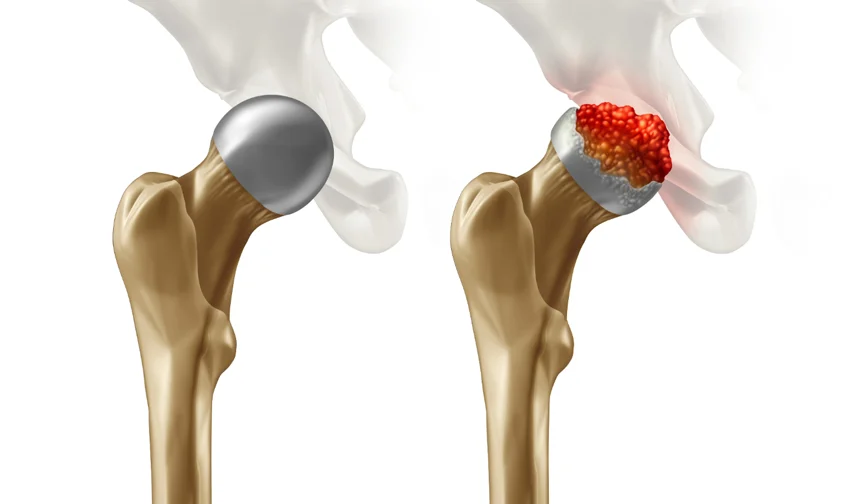Hip AVN Treatment

What is Avascular Necrosis of the Hip
Avascular necrosis (AVN) of the hip, also known as osteonecrosis, is a condition that occurs when there is a loss of blood supply to the bone, leading to the death of bone tissue. This lack of blood flow can cause the bone to collapse, leading to joint pain and mobility issues. Here’s a closer look at AVN of the hip:
The hip joint receives its blood supply from a limited number of blood vessels. When the blood flow to the hip is disrupted, it can lead to a condition called avascular necrosis (AVN), also known as osteonecrosis, which means “bone death.” This paper will explore what occurs when the hip’s blood supply is compromised.
The hip joint is a key ball-and-socket joint in the body. It consists of the acetabulum, or hip socket, which is a deep cup that holds the ball at the top of the thigh bone. The thigh bone is called the femur, and the round part at its end is known as the femoral head. This ball-and-socket structure allows for a wide range of motion, which is important for everyday activities like walking, squatting, and climbing stairs. The hip joint is supported by strong muscles in the buttocks and thighs.
Cause of Avascular Necrosis of the Hip
Avascular necrosis (AVN) of the hip, also known as osteonecrosis, occurs when there is a disruption of blood supply to the femoral head, leading to bone cell death and potential collapse of the bone structure. This condition can result from various factors, including trauma or injury to the hip joint, long-term use of corticosteroids, excessive alcohol consumption, and certain medical conditions such as sickle cell disease or lupus. The lack of adequate blood flow prevents the delivery of essential nutrients and oxygen to the bone, which can ultimately lead to severe pain, limited mobility, and joint deterioration if not treated promptly.
Risk Factors
While the exact causes of reduced blood flow can be challenging to identify, several risk factors may increase an individual's likelihood of developing this condition. It's essential to be aware of these factors before considering AVN hip treatment.
One significant risk factor is the use of steroid medications, which are commonly prescribed for various conditions such as asthma, rheumatoid arthritis, and systemic lupus erythematosus. Although the precise mechanism by which these drugs may lead to osteonecrosis remains unclear, there is substantial evidence linking long-term steroid use to the development of this serious condition.
Symptoms of Avascular Necrosis of the Hip
Avascular necrosis of the hip, also known as osteonecrosis, typically presents with a gradual onset of symptoms. Early on, individuals may experience mild to moderate pain in the hip joint, which can radiate to the groin or thigh. This pain often worsens with activity and improves with rest. As the condition progresses, the pain may become constant and more severe, leading to difficulty in weight-bearing activities and a limited range of motion in the hip. Patients might also notice stiffness in the joint, swelling, and a limp. In advanced stages, avascular necrosis can result in joint collapse and severe disability.
Doctor Examination for the Treatment of Hip Pain
If you're experiencing hip pain, a doctor's examination is essential for determining the underlying cause and appropriate treatment. Here’s an overview of what you might expect during an examination:
- Describe your pain, including its onset, duration, location, and any factors that worsen or relieve it.
- Discuss any prior injuries to the hip or surrounding areas.
- The doctor will feel around the hip joint and surrounding muscles to identify areas of tenderness or abnormalities.
- X-rays: To check for fractures, arthritis, or other bone abnormalities.
- MRI or CT Scan: These provide detailed images of soft tissues, including muscles, tendons, and cartilage, helping to identify issues like tears or inflammation.
AVN Hip Treatment in Jaipur
Dr. R.K. Mathur in Jaipur is renowned for his expertise in treating Avascular Necrosis (AVN) of the hip. He employs advanced diagnostic techniques and personalized treatment plans tailored to the individual needs of patients. His approach often combines both conservative and surgical options, including hip joint preservation procedures, which aim to relieve pain and restore mobility. With a focus on minimally invasive techniques, Dr. Mathur strives to improve outcomes and enhance the quality of life for those suffering from AVN. His commitment to patient care and ongoing research in orthopedic advancements make him a trusted specialist in the region.
What are the Hip Replacement Preoperative Instructions?
- Complete any required medical evaluations, including blood tests, EKGs, and imaging studies.
- Quit smoking to enhance healing and reduce surgical risks.
- Engage in physical therapy or exercises as recommended to strengthen muscles around the hip and improve mobility.
- Maintain a healthy diet to optimize your overall health prior to surgery.
- Follow any dietary restrictions, which may include fasting after midnight or consuming only clear liquids.

